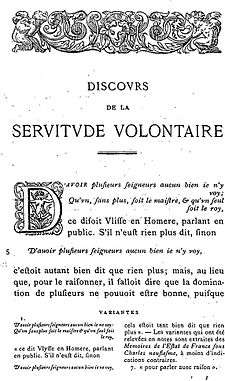Discourse on Voluntary Servitude
 | |
| Author | Étienne de La Boétie |
|---|---|
| Original title | Discours de la servitude volontaire ou le Contr'un |
| Country | Kingdom of France |
| Language | Middle French |
| Genre | Essay |
Publication date | 1576 |
The Discourse on Voluntary Servitude, or the Against-One (French: Discours de la servitude volontaire ou le Contr'un) is the most famous work of Étienne de La Boétie. The text was written probably around 1549 and published clandestinely in 1576 under the title of Le Contr'un ("The Against-One"). "One" here means 'single ruler'.
The date of preparation of the Discourse on Voluntary Servitude is uncertain: according to recent studies it was composed by Étienne de La Boétie during his university education. According to his closest friend Michel de Montaigne, the speech was written when La Boétie was about 18 years old.[1]
Content
The essay argues that any tyrant remains in power until his subjects grant him that, therefore delegitimizing every form of power. The original freedom of men would be indeed abandoned by society which, once corrupted by the habit, would have preferred the servitude of the courtier to the freedom of the free man, who refuses to be submissive and to obey.
This relation between domain and obedience would be resumed later by anarchist thinkers. Lew Rockwell summarizes La Boétie’s political philosophy as follows:
To him, the great mystery of politics was obedience to rulers. Why in the world do people agree to be looted and otherwise oppressed by government overlords? It is not just fear, Boetie explains in “The Discourse on Voluntary Servitude,” for our consent is required. And that consent can be non-violently withdrawn.[2]
Influence
The thought of La Boétie was also taken up by many movements of civil disobedience, which drew from the concept of rebellion to voluntary servitude the foundation of its instrument of struggle. Étienne de La Boétie was one of the first to theorize and propose the strategy of non-cooperation, and thus a form of nonviolent disobedience, as a really effective weapon.
Bibliography
- Œuvres complètes, Editions William Blake & Co., 1991. ISBN 2-905810-60-2
- Discours de la servitude volontaire, Editions Mille et une nuits, 1997. ISBN 2-910233-94-4
- Discours de la servitude volontaire, Editions Flammarion, 1993. ISBN 2-08-070394-3
- The Politics of Obedience: The Discourse of Voluntary Servitude, translated by Harry Kurz and with an introduction by Murray Rothbard, Montrèal/New York/London: Black Rose Books, 1997. ISBN 1-55164-089-9
- The Politics of Obedience: The Discourse of Voluntary Servitude, translated by Harry Kurz and with an introduction by Murray Rothbard, Free Life Editions, 1975. ISBN 0-914156-11-X
References
- ↑ Rockwell, Lew (11 February 2011), p. 38. n. 2. "Having remained long in manuscript, the actual date of writing the Discourse of Voluntary Servitude remains a matter of dispute. It seems clear, however, and has been so accepted by recent authorities, that Montaigne's published story that La Boétie wrote the Discourse at the age of eighteen or even of sixteen was incorrect. Montaigne's statement, as we shall see further below, was probably part of his later campaign to guard his dead friend's reputation by dissociating him from the revolutionary Huguenots who were claiming La Boétie's pamphlet for their own. Extreme youth tended to cast the Discourse in the light of a work so youthful that the radical content was hardly to be taken seriously as the views of the author. Internal evidence as well as the erudition expressed in the work make it likely that the Discourse was written in 1552 or 1553, at the age of twenty-two, while La Boétie was at the university." See Paul Bonnefon (1892), pp. 390–1; and Donald Frame, Montaigne: A Biography (New York: Harcourt Brace, & World, 1965), p. 71 (37–38 n. 2).
- ↑ Rockwell, Lew (11 February 2011), Étienne de la Boetie and Egypt, LewRockwell.com
Further reading
- Keohane, Nannerl O. (1977). ‘The Radical Humanism of Étienne de la Boétie’, Journal of the History of Ideas. 38:119–130.
- Lablénie, Edmond (1930). ‘L’Énigme de la “Servitude Volontaire”’, Revue du seizième siècle. 17:203–227 [French].
- Podoksik, Efraim (2003). ‘Estienne de La Boëtie and the Politics of Obedience’, Bibliothèque d’Humanisme et Renaissance. LXV(1): 83–95.
- Presley, Sharon (2008). "La Boétie, Étienne de (1530–1563)". In Hamowy, Ronald. The Encyclopedia of Libertarianism. Thousand Oaks, CA: SAGE; Cato Institute. p. 277. ISBN 978-1-4129-6580-4. LCCN 2008009151. OCLC 750831024.
- Rothbard, Murray. 'Ending Tyranny Without Violence', originally titled The Political Thought of Étienne de La Boétie
External links
- The Politics of Obedience: The Discourse of Voluntary Servitude, from The Ludwig von Mises Institute, Online Edition (PDF).
- (English) Discours de la servitude volontaire, translated and with an introduction about its reception.
- (French) Text on Wikisource.
- Poetry (in French).
- (Dutch) Vertoog over de Vrijwillige Slavernij (pdf)
- Etiennedelaboetie.net – Website dedicated to the works and life of Etienne de La Boétie
- Ending Tyranny Without Violence(The Political Thought of Étienne de La Boétie) by Murray N. Rothbard.
- (English) (German) (French) Étienne de La Boétie: Against Voluntary Servitude – Discourse on the fall of tyrants Online-Exhibition (2012)
